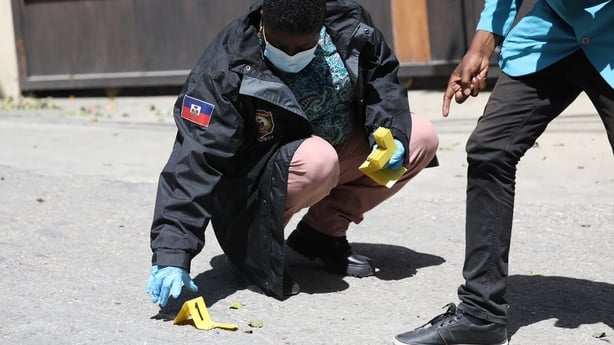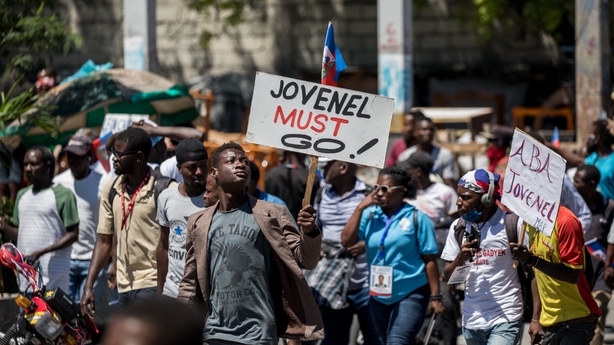United Nations Secretary-General Antonio Guterres has condemned the assassination of Haitian President Jovenel Moise and called for those responsible to be brought to justice.
President Moise was shot dead by unidentified attackers in his private residence overnight, stirring fears of escalating turmoil in the impoverished Caribbean nation.
"The Secretary-General calls on all Haitians to preserve the constitutional order, remain united in the face of this abhorrent act and reject all violence," U.N. spokesman Stephane Dujarric said
"The United Nations will continue to stand with the Government and the people of Haiti."
Haiti's Interim Prime Minister Claude Joseph urged the United Nations to hold a Security Council meeting on the island nation's situation as soon as possible following the assassination.
In a statement, Mr Joseph called on the "international community to launch an investigation".
The assassination coincided with a wave of gang violence in Port-au-Prince as armed groups have battled with police and one another for control of the streets in recent months, turning many districts of the capital into no-go zones.
Security situation 'under control'
The 53-year-old president's wife, Martine Moise, was also shot in the attack that took place around 1am local time (6am Irish time) and was receiving medical treatment.
"A group of unidentified individuals, some of them speaking Spanish, attacked the private residence of the president of the republic and thus fatally wounded the head of state," Mr Joseph said.

Mr Joseph said the police and army had the security situation under control though gunfire could be heard throughout the capital of 1 million people after the attack.
With Haiti politically polarised and facing a growing humanitarian crisis and shortages of food, fears of widespread chaos are spreading.
The Dominican Republic said it was closing the border it shares with Haiti on the island of Hispaniola.
The country of about 11 million people - the poorest nation in the western hemisphere - has struggled to achieve stability since the fall of the Duvalier dictatorship in 1986, and grappled with a series of coups and foreign interventions.
A UN peacekeeping mission - meant to restore order after a rebellion toppled then-President Jean-Bertrand Aristide in 2004 - ended in 2019 with the country still in turmoil.
In recent years, Haiti has been hit by a series of natural disasters and still bears the scars of a major earthquake in 2010.
Mr Moise, a banana exporter-turned-politician, faced fierce protests after taking office as president in 2017.
This year, the opposition accused him of seeking to install a dictatorship by overstaying his mandate and becoming more authoritarian. He denied those accusations.
"All measures are being taken to guarantee the continuity of the state and to protect the nation," Mr Joseph said.
Mr Moise had ruled by decree for more than a year after the country failed to hold legislative elections and wanted to push through a controversial constitutional reform.
Dominican Republic President Luis Abinader held an emergency meeting earlier today about the situation in Haiti but had yet to issue a statement.

Global response to 'tragic attack'
US President Joe Biden said Wednesday he was "shocked" by the assassination of Haiti's president and that "a lot" more information is needed.
"We are shocked and saddened to hear of the horrific assassination of President Jovenel Moise and the attack on First Lady Martine Moise," Biden said in a statement.
"We condemn this heinous act and I am sending my sincere wishes for First Lady Moise's recovery," he added.
The opposition in Haiti had accused the US - Haiti's top foreign donor - of being lenient towards Mr Moise, given his support for US foreign policy.
His administration broke ranks with the Caribbean community (Caricom) to oppose Venezuelan President Nicolas Maduro.
British Prime Minister Boris Johnson said the assassination was an abhorrent act and appealed for calm.
"I am shocked and saddened at the death of President Moise,"Mr Johnson said.
"Our condolences are with his family and the people of Haiti. This is an abhorrent act and I call for calm at this time."
I am shocked and saddened at the death of President Moïse. Our condolences are with his family and the people of Haiti. This is an abhorrent act and I call for calm at this time.
— Boris Johnson (@BorisJohnson) July 7, 2021
"All light must be cast on this crime that took place in a deteriorating political and security climate. I call on all actors in Haitian political life for calm and restraint," French Foreign Minister Jean Yves Le Drian said in a statement.

